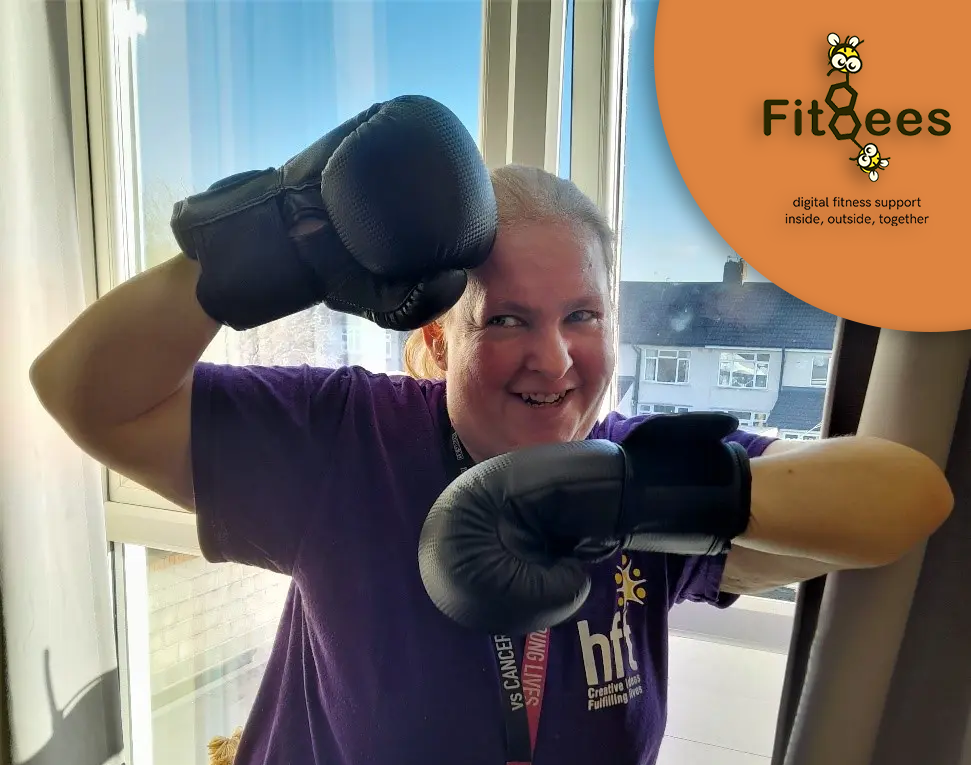Penny’s fighting fit with FitBees
The importance of involving people with learning disabilities in the design of digital fitness products for the future.
Researchers at the University of the West of England (Bristol) have observed a clear correlation between the level of activity of a learning-disabled woman and the time she spent with visitors, suggesting that having visitors has a positive impact on activity levels.
By identifying instances where increased sedentary time coincides with periods of solitude, valuable conversations aimed at encouraging greater physical activity among underrepresented groups can be initiated.
Penny’s story
The data was gathered from Bristol resident, Penny, who was one of the early adopters of FitBees, national learning disability charity Hft’s innovative UK Research and Innovation-backed project with Tendertec aimed at empowering people, underrepresented within the digital fitness market, to improve their fitness sustainably.
Since starting the FitBees programme, Penny has surprised herself, and her supporters, by throwing herself wholeheartedly into a new sporting challenge: kickboxing.
The 43-year-old now attends the brightly coloured Bristol Martial Arts Academy (BMAA) three to four times a week. She is also now setting her sights on obtaining her very first black belt.
And thanks to all her hard work, Penny has added a variety of kickboxing techniques to speak of in her armoury, from shovel punches to ‘spinning hook’ kicks, all gained under the tutelage of BMAA’s sensei.
Penny says: “I used to go to judo years ago, as I was living just around the corner from where it was held. When I got involved in FitBees, and heard about doing kickboxing, I thought, ‘bring it on!’
“I really like doing FitBees. I find it very helpful, and I like going to Bristol Martial Arts Academy. If I ever get a bit stuck with anything, I can just say, ‘Sensei, can you help? I’m a bit lost!’ And they will help.
“I’m now going to get into sparring. I do a type of kickboxing called ‘Umai Dragon Freestyle Kickboxing’, which means ‘skilful’ in Japanese – so I’m learning Japanese too!”

Digital dynamo
As a digital fitness-focused initiative, FitBees emphasises a ‘wraparound’ approach to participants’ use of smart technologies. Those taking part get access to Hestia, Tendertec’s connected care platform, which generates activity reports using data collected from Tendertec’s AI home heat sensors and other third-party wearable devices. Alongside, participants get access to motivational encouragement and community connections to support their activities.
Penny has been using a smart watch for a while to help her keep tabs on her physical fitness. However, after joining FitBees, she has started using the device to help monitor her sleep patterns too – something she is keen to keep track of.
On a recent visit, she showed Personalised Technology Project Coordinator, Ben Williams, how she was using her smart watch to log her sleep. She was reassured and pleased to record when she had successfully gone to bed and woken up at her targeted times.
UWE researchers analysed data about Penny that was collected by Tendertec’s AI home sensors over a period of 72 days. These sensors provided information about how much time Penny spent in sedentary positions, being active, alone, or with visitors.
From insights to impact
“These insights together with the recorded personal blogs and medical/physiotherapy intervention records, can assist researchers and medical professionals supporting underrepresented groups in becoming more active. By better understanding and identifying behaviour patterns, as well as analysing the effects of interventions, they can take appropriate action to regulate and improve activity levels,” says Dr Virginia Ruiz Garate, Visiting Professor at UWE Bristol.
“The data offers interesting insights into an individual’s daily activities, shedding light on key areas for discussion and focus with both the person and their circle of support,” says Emma Nichols, Hft’s Personalised Technology Manager.
“These findings also serve as a catalyst for meaningful dialogues among social and healthcare professionals, fostering discussions about necessary changes to the person’s support. Importantly, this approach proves invaluable in situations where individuals have limited means to communicate their own health and wellbeing, enabling us to gain valuable insights into factors such as sleep quality and activity levels.”
At the heart of FitBees, Ben says, is helping people to find what works for them in the pursuit of better health and wellbeing, for the long term.
He says: “The most important thing with all of this is that it is about sustainable fitness – that Penny is able to go at her own pace, and not rush things.”
Penny is now keen to try out a set of ‘smart’ leggings, which are in the works for the FitBees programme, using electronics woven into the fabric to provide intuitive real-time fitness data.
Related Content
Related programme

Healthy Ageing Community of Practice
The Healthy Ageing Community of Practice is a collaborative learning community for businesses, social ventures, researchers, investors and policymakers to connect and share knowledge and insights in relation to healthy ageing.

